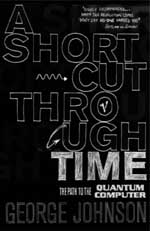32
Infinity is more than simply the biggest ever number, and even this simple description has caused problems for mathematicians throughout the ages. From the ancient Greeks to Newton, from Newton to present-day mathematicians such as Cristian Claude and Boris Pavlov of New Zealand, infinity has posed both practical and conceptual problems.
It feels like we've always known that the universe began with a Big Bang, and like the Big Bang could never have been called anything else. But this is far from the truth, as Simon Singh explains in this overview of the state of human knowledge about the beginning of everything (or, as Calvin of "Calvin and Hobbes" preferred to call it, the Great Kablooie).
Most of us could not work without a computer, or have a good time without a CD player, and yet we know very little about the way computers work or the quantum mechanical principles behind lasers. These two subjects involve complex concepts and it is not easy to explain them in a brief book. Nevertheless, "A shortcut through time" manages to present a clear and enjoyable crash course on quantum computers, a science which lies at the intersection between quantum mechanics, computer science and mathematics.
Francesca Harris has always known she wanted to work in the music or film industry, and she has found that her maths skills have stood her in good stead as she works her way up.
The three door problem has become a staple mathematical mindbender, but even if you know the answer, do you really understand it? Phil Wilson lets his imagination run riot in this intergalactic application of Bayes' Theorem.
Frances Elwell looks at the eddies and currents, from the pungent problem of sewage outflow to the search for bodies of people who have fallen into rivers, explaining that fluid mechanics lies behind it all.
Regular Plus contributor Lewis Dartnell reports on the scramble for million-dollar prizes that made mathematical headlines at the BA Festival of Science in September 2004.
Mathematician and physicist John Baez declares himself fascinated by exceptions in mathematics. This interest has led him to study the octonions, and, through them, to find out more about the origins of complex numbers and quaternions. In the first of two articles, he talks about connections between algebra and geometry, and the importance of lateral thinking in mathematics.


